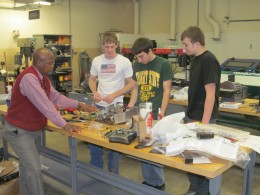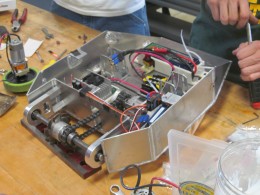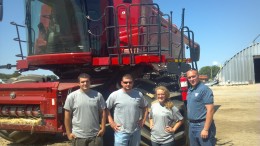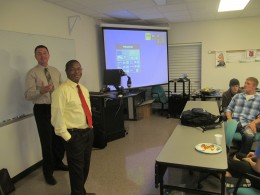
Director of Lake Campus Engineering Ruby Mawasha and students Jordon Coffman, John Neifert and Jared Runyon working on their battle bot Crimson Chaos.
Asked to describe his Lake Campus engineering students, Ruby Mawasha offered an anecdote that speaks volumes. At the end of the last term, he recommended a series of homework problems that would not be graded. Each student had them done by the next class and with the same effort as the graded assignments.
“The work ethic is a difference I see in the students at the Lake Campus. When they do something, they do it very well. They are committed,” said Mawasha, Ph.D., director of Lake Campus Engineering and assistant dean in the College of Engineering and Computer Sciences.
Student interest is clearly a big factor in the rapid growth of a program that’s quickly become a success story in Celina. An ‘all in’ attitude from area industries is driving growth too.
“The interest is phenomenal. They all wish they could fast-forward and get these kids now,” said Jared Ebbing, Mercer County economic development director. “They cannot wait to get their hands on them.”

Designed by Lake Campus engineering underclassmen, the battle bot Crimson Chaos helped the team advance all the way to the national ExtremeBot competition in Indianapolis.
The bachelor’s program in engineering at the Wright State Lake Campus was created with a goal of enrolling 100 students in four years. With more than 80 students currently, for all intents and purposes, that goal was met in two.
Mawasha believes part of what’s fueling interest is a recommitment by area industries to retrain employees by leveraging established partnerships with the Lake Campus.
Students, he said, are jumping at the chance to work in engineering positions with local businesses while taking classes at the same time. There’s also a shift afoot in the region away from traditional apprenticeship structures and toward a system placing more value on bachelor’s degrees.
Factor in a robust advanced manufacturing segment in Mercer and Auglaize counties that’s feeding a growing need for engineering talent and it’s easy to see why the business of teaching engineering students is booming.

Students take regular site visits including this trip to the VanTilburg Family Farm where automated technology is a vital part of the process. (Left to right) Students Andrew Stienke, Kris Hyde and Jennifer VanTilburg (no relation) with Luke VanTillburg of the VanTilburg Family Farm.
Program designers want to top off at enrolling 25 new students each fall, but demand is so high they’re being forced to marshal up classroom space in creative ways they’d never considered.
Jordon Coffman is one of many students who chose the program because of its value and proximity to home.
“When I was growing up, I just liked taking things apart and putting them back together and making them work again,” said Coffman, a junior who started taking classes at Lake because of competitive price and proximity to home. “I’m not sure what I want to do in mechanical engineering yet, but I’d really like to be part of a design process.”
Designers of the burgeoning engineering program have built-in opportunities for students to attend technical conferences to present papers and make professional connections.
Last spring, for the first time, Lake Campus students participated in the XtremeBot competition in Dayton—a gladiator-type competition with remote-controlled robots—and ultimately advanced to the National Robotic League Championships in Indianapolis.

Regular, in-class presentations by representatives from area industries are integral to the learning process with the Lake Campus program. During this visit, Jeff Davis shared information about software used at Crown Equipment.
“Wright State had two teams of seniors from Dayton, and a team of sophomores from Lake, and they were equal,” said Mawasha. “The Lake students have an ability to work with hands-on type of equipment that allows them to progress a little bit faster.”
Coffman agreed, “they would teach us how to machine our own parts to build the bot, and they’d only have to show a couple of us once and then we could do it.”
Other students are planning to try their hand at building a plane when they compete in the Society of American Engineers aero design competition in the fall.
Perhaps the most unique opportunity will be an international experience that Mawasha and others have planned for them next year, a twist on the Taiwan International Leadership Program trip Dayton students have been taking for years.
“We saw that the community up north was German-based, and so we decided to try and leverage some German partnerships to start the same thing there for the students at Lake Campus,” said Mawasha.
Students will spend a month in Jena, Germany, at Ernst–Abbe Fachhochschule/University of Applied Sciences, where they will work with German engineering students to build battle-bots for a competition at the end of the trip. Wright State students will specialize in the mechanical and manufacturing aspects, while their German counterparts will build the microprocessors. Students will visit German manufacturing operations each week and take in the culture on the weekends.
It should be a trip the students remember for a lifetime, but one that area businesses hope will help round out a growing workforce they’re counting on in the future.
“This is the most important new program at Wright State Lake Campus that has come along in many, many years,” said Ebbing. “It is a perfect fit.”

 Wright State names Rajneesh Suri dean of Raj Soin College of Business
Wright State names Rajneesh Suri dean of Raj Soin College of Business  ‘Only in New York,’ born at Wright State
‘Only in New York,’ born at Wright State  Wright State president, Horizon League leaders welcome new commissioner
Wright State president, Horizon League leaders welcome new commissioner  Wright State celebrates homecoming with week-long block party
Wright State celebrates homecoming with week-long block party  Wright State baseball to take on Dayton Flyers at Day Air Ballpark April 15
Wright State baseball to take on Dayton Flyers at Day Air Ballpark April 15 